#the terror meta
Text
Just thinking about the foreshadowing in the first 3 episodes of The Terror again as to Goodsir’s fate, what with him performing the autopsy on David Young and trying to save Silna’s dad. How Stanley identifies him as ‘lesser’ (or even ‘other’) due to his training as an anatomist. And just how Goodsir recognizes the bodies he works on as people still even as he’s cutting into them. He was coded as ‘The Butcher’ from the beginning but was fighting against it the whole time
#I’ve just thinking a lot about the ritual of cannibalism??#and until Goodsir’s death the mutineers know what they’re eating but aren’t forced to confront it#I also find it really interesting that Goodsir is so against survival cannibalism#like is it just the situation (i.e. being kidnapped and Hickey killing people)#and he would of been cool with Camp Little eating people#it is he just fundamentally opposed#the terror#the terror amc#harry goodsir#the terror meta
95 notes
·
View notes
Text
one thing that's really funny to me about all the analysis and meta over the scene from the terror where fitzjames holds the dress up to his body during the carnival is that when a group of students asked david kajganich, the showrunner, about it, he, a gay man, told us explicitly that there's no underlying subtext about queerness in that scene...it was simply customary for men to dress up as women during silly carnivals like that as a type of comedic performance (and we can see the effects this has had on modern british conceptions of "men in dresses'' centuries later but i digress).
anyway that doesn't mean we can't do queer readings of that scene, especially in light of the intimacy and push and pull of fitzjames' relationship with crozier, but it is really funny that so much of the queer reading of this character centers around that stupid dress when it really was more about the fact that fitzjames felt he had to represent a more masculine picture during the carnival in light of the circumstances, to be strong for his men. then again, this is inherently dealing with ideas of gender, and therefore implicitly, sexuality. so even if kajganich meant nothing by it in a gender-nonconforming way, it still is read as such.
#the terror#david kajganich#james fitzjames#the terror amc#amc the terror#josiah speaks#the terror meta
49 notes
·
View notes
Text
okay look i know this is just a wild hunch and relies pretty much solely on that one line about blanky feeling like he just got engaged, but what if the reason silna couldn’t successfully bond with tunnbaq is because blanky did. he may not have lost a tongue, but he sure lost a leg. plus, why would the tuunbaq veer off away from the others simply to track down one already-dying man, if not because blanky might as well have had a homing signal on him from their accidental bonding.
#*gestures to wall of insane theories and red strings* its all coming together#thomas blanky#the terror#the terror amc#the terror meta
146 notes
·
View notes
Text
[suicide cw] going crazy over here because the fact that Harry Goodsir kills himself with the shards of the broken camera lens has IMPLICATIONS. he is the closest we get to an outside observer! his whole job is to observe and document, and that includes his role as photographer. the idea that one of the tools he uses for observation is what he uses to cut his wrists is A LOT, not to mention that the other cause of death is his medicine cocktail. tools from both his role as an observer and as a doctor are what kill him in the end. Goodsir is framed as the “good guy” but no one on that expedition can escape the fate laid out for them, and their deaths are a direct consequence of their participation in imperialism. he is not innocent, no matter how close to the perimeter he is. Goodsir shows that it doesn’t matter how altruistic or well meaning anyone’s actions are on this expedition (ie. being a doctor, shoulder to lean on, teacher & student), because they have been slowly killing themselves from the start. Goodsir himself is an outwardly harmless tool supporting the efforts of imperialism, and like the camera & the medicine, he is reframed and used to reflect that violence.
#SHAKES YOU BY THE SHOULDERS DOES THIS MAKES SENSE#suicide cw#self harm cw#sorry for goodsirposting. as if it’s my fault.#just having a lot of feelings out here#HARRRRRYYYYYYYYYYY#the terror amc#the terror#harry goodsir#the terror meta#uhhh yea </3
128 notes
·
View notes
Text
Crazy how there are three Henry Collinses:
One was born in Sussex in 1818 into a naval family. He was predeceased in childhood by a twin brother. His daguerreotype shows a skinny guy with big hands who doesn’t want to fight you but he will if he has to—he has that jut to his jaw, you know? He died on the Franklin Expedition. He was a real guy, as real as you are reading this, as I am trying to write it down: and he died. They all did, the entire expedition. Like, for real. Holy shit.
In The Terror (2018) television series, the second Henry Collins is played with gutting earnestness by your favorite blorbo and mine, Trystan Gravelle. Gravelle’s Collins is the first to step into The Terror as a horror story when he is unable to save crewmate Billy Orren from drowning and shortly thereafter sees Billy’s body—or his ghost—suspended in the water when he dives beneath the surface to free the ship’s propeller from ice. From then on out his character is the most explicit expression of the mental and emotional disintegration of the entire crew, acting almost as the last single member of a trembling Greek chorus.
Then there’s fic Henry Collins. Sometimes he’s an alcoholic or a merman or a Gulf War veteran. His tits are magnificent. He’s seven feet tall and ⅓ of it is dick. He has PTSD and can’t stop eating Harry Goodsir’s ass about it. He’s a symbol through which many fans, such as myself, obliquely engage with our own profound traumas. Like the trauma of not getting to eat Harry Goodsir’s ass.
#the terror#henry collins#henry foster collins#the terror meta#trystan gravelle#franklin expedition#happy birthday Henry Collins#you need to stop talking about Collins eating ass#but he eats ass
75 notes
·
View notes
Text
finally the terror brain worms are eating me and i need to type out some words.
just rewatched ep9 and i think it is my favourite. when i first watched it and bridgens steps away, i thought, why is he, as the last doctor, leaving the terror camp men behind? they are all sick, they need a doctor! now i've realized, the doctors never could treat the men anyway.
sure, they could treat superficial wounds, like scratches on the hands, and their presence probably reassured everyone. but they never could treat any of the actual diseases (scurvy, lead poisoning). only the symptoms. see morfin or collins. even blanky's leg couldn't rly be treated and started to decay. everyone was sick and doomed to remain so since the beginning. still i think bridgens stepping away, as the last man potentially being able to properly treat the sick, hammers home the message that the death of all is close.
interestingly though, there are three things that were treated and healed properly: crozier's addiction to alcohol, silna's cut tongue, and hickey’s (and the other two guys’) cuts from the flogging.
however, only the first two healed w/o any complications shown. crozier was never shown to struggle w alcohol again and silna was never shown having any trouble eating and communicating despite her missing tongue. hickey’s wounds however, where shown to bleed after the initial treatment. like, his wounds were treated and were shown bleeding in separate episodes, if i recall it correctly.
there’s also crozier’s wounds from tuunbaq and his severed hand that were treated and healed nicely, but i feel since this happens at the conclusion of the story and is done not by a doctor but by silna, it is maybe set apart from the other things i’ve mentioned????
now i remember the frozen toes that had to be amputated... since no complications were shown they must have healed well... idk maybe my thoughts rly aren’t leading anywhere
#i'm too tired now to keep thinking abt this. i thought i had connected the dots but maybe not!#the terror 2018#the terror meta#personal log stardate#alcohol cw#gore cw#fandom related#death cw#the terror spoilers#im rly tired. like its almost midnight i gotta go to bed#gotta hit post now
6 notes
·
View notes
Text
Hartnell's reformation thanks to flogging
I like how one of the guys came out of that ‘reformed’ and wanting to try better; that was the whole point of punishment, after all. Hartnell is sorry for what he did, regrets it, has seen the error of his ways, etc. Of the three that were caught, we have Hickey who is doing his own thing, Manson who is easily swayed, and Hartnell who thinks a lot more for himself, especially away from Hickey’s influence. He comes to his own conclusion.
But also... Hartnell didn’t see Hickey’s flogging. He knows it happened, and how, no doubt heard about it after. But he didn’t see it. Wasn’t there in the crowd of men watching the humiliation, couldn’t feel the uneasy atmosphere. I wonder if it might have been harder for him to think of having a second chance with the captain if he saw Hickey’s lashing. Or perhaps he would have agreed with it. Hickey was the one who led him astray after all, so maybe Hartnell thinks he deserved every lash he got.
#i'm just thinking out loud don't mind me#the terror amc#tom hartnell#thomas hartnell#terror meta#the terror meta#losing track of the tags i use oops#just having a moment how the punishment made one guy better#others worse#hartnell meta#my meta
8 notes
·
View notes
Text
“In the war film, a soldier can hold his buddy—as long as his buddy is dying on the battlefield. In the western, Butch Cassidy can wash the Sundance Kid’s naked flesh—as long as it is wounded. In the boxing film, a trainer can rub the well-developed torso and sinewy back of his protege—as long as it is bruised. In the crime film, a mob lieutenant can embrace his boss like a lover—as long as he is riddled with bullets.
Violence makes the homo-eroticism of many “male” genres invisible; it is a structural mechanism of plausible deniability.”
–Tarantino’s Incarnational Theology: Reservoir Dogs, Crucifixions, and Spectacular Violence. Kent L. Brintnall.
#Another day another quote that's been rattling around in my head for an age#Which again sums things up better than I ever could#And of course it's not just about the physical deterioration at the end of the story allowing for intimacy#The idea permeates the whole show#Tozer holding Heather as his exposed brain freezes on the deck#Crozier and Hickey reaching a state of psychological intimacy but only through the violence of the lash#You could argue a link between Hickey and Goodsir too through the intimacy and violence inflicted on Irving#Both his killing and his autopsy#The Terror#The Terror AMC#Meta
25K notes
·
View notes
Text
It's about Crowley bearing witness to Aziraphale's desire, about the way that desire is animal and visceral and enormous and terrifying*. And about how Crowley sees that and wants it. Crowley offers the ox rib and watches Aziraphale eat because eating provides them no sustenance, it's purely for pleasure, sensual, selfish. And Crowley introduces Aziraphale to this, and thousands of years later still takes obvious pleasure in feeding Aziraphale, in watching him eat. In watching Aziraphale's pleasure.
And I think it's significant the things we see Crowley put into his body in s2, and why: six shots of espresso, as something bracing before seeing what it is that made Aziraphale call him in his "something's wrong" tone; whiskey, because he has to give Aziraphale some bad news; wine, because they "might as well get comfortable" during the storm coming down on Job, after Aziraphale learns that Crowley is actually pretty unhappy with Job's suffering; and poison, to dispose of it so Elspeth (or Wee Morag, I've fogotten which is which) doesn't die. Crowley doesn't take Aziraphale's "something that calms you down", only consumes things that not only don't bring him pleasure but are an attempt to prevent pain. Crowley, who introduced Aziraphale to this important physical, sensual, selfish pleasure, denies it to himself. He denies himself the eccles cakes, he denies himself partaking in food, and he denies himself Aziraphale.
And we see throughout the rest of the season other things he's denying himself: the comfort and safety of a home in the bookshop in favor of the mobility and ready-made escape of living in the Bentley, the surety of saying what he really means during the confession. He cannot bring himself to admit what he wants, that he wants. Gabriel and Beelzebub "going off together" is not what he wants. He wants Aziraphale, but he doesn't say that, because he's never, in the years and years and years we've seen this season, let himself want or be seen wanting. "Going off together" is as close as he can get to speaking it. "A group of the two of us" is as close as he can get. So he has to watch as Aziraphale leaves and takes his pleasure in the world with him.
#* rilke: 'Who if I cried out would hear me amidst the angels' hierachies? and if even one of them pressed me against his heart:#I would be CONSUMED#in that overwhelming existence. For beauty is nothing but the beginning of terror which we still are just able to endure#and we are so awed because it serenely disdains to annihilate us. Every angel is terrifying.'#anyway. i have never been normal about this and i will never be normal about this#and what is love but hunger#go spoilers#good omens#meta
6K notes
·
View notes
Text

Captain Francis Crozier, at Furthest North.
#the terror amc#francis crozier#my art#can't believe it took me 2 rewatches AND getting refs for this to realize it's the hungarian state opera house. girl i was there last month#anyway yeah i was looking at gifsets of the last shot of the show and feeling nauseous with emptiness etc etc when#the thought struck me that it looks an awful lot like the tableau vivants from the ep1 flashbacks in its stillness#i have no idea whether that was an intentional reference (a sort of twisted mockery of how that scrubbed and polished portrayal of history#contrasted with the deeply sad and inglorious reality#or some sort of meta about storytelling itself. i'm not really smart enough to say lol) but i made this anyways. enjoy#pattern recognition go brrrrrrrrrrrrrr#i bent over backwards trying to make this symmetric and harmonious. it isn't but if i don't post it now i never will
1K notes
·
View notes
Text
There’s a line from American Gods I keep coming back to in relation to Yellowjackets, an observation made early on by Shadow in prison: “The kind of behavior that works in a specialized environment, such as prison, can fail to work and in fact become harmful when used outside such an environment.” I keep rotating it in my head in thinking about the six survivors, the roles they occupy in the wilderness, and the way the show depicts them as adults in society.
Because in the wilderness, as in prison, they’re trapped—they’re suffering, they’re traumatized, they’re terrified—but they’re also able to construct very specific boxes to live in. And, in a way, that might make it easier. Cut away the fat, narrow the story down to its base arc. You are no longer the complex young woman who weighs a moral compass before acting. You no longer have the luxury of asking questions. You are a survivor. You have only to get to the next day.
Shauna: the scribe. Lottie: the prophet. Van: the acolyte. Taissa: the skeptic. Misty: the knight. Natalie: the queen. Neat, orderly, the bricks of a new kind of society. And it works in the woods; we know this because these six survive. (Add Travis: the hunter, while you’re at it, because he does make it to adulthood).
But then they’re rescued. And it’s not just lost purpose and PTSD they’re dealing with now, but a loss of that intrinsic identity each built in the woods. How do you go home again? How do you rejoin a so-called civilized world, where all the violence is restricted to a soccer field, to an argument, to your own nightmares?
How does the scribe, the one who wrote it all out in black and white to make sense of the horrors, cope with a world that would actively reject her story? She locks that story away. But she can’t stop turning it over in her head. She can’t forget the details. They’re waiting around every corner. In the husband beside her in bed. In the child she can’t connect with across the table. In the best friend whose parents draw her in, make her the object of their grief, the friend who lives on in every corner of their hometown. She can’t forget, so she tries so hard to write a different kind of story instead, to fool everyone into seeing the soft maternal mask and not the butcher beneath, and she winds up with blood on her hands just the same.
How does the prophet come back from the religion a desperate group made of her, a group that took her tortured visions, her slipping mental health, and built a hungry need around the very things whittling her down? She builds over the bones. She creates a place out of all that well-intended damage, and she tells herself she’s helping, she’s saving them, she has to save them, because the world is greedy and needs a leader, needs a martyr, needs someone to stand up tall and reassure everyone at the end of the day that they know what’s best. The world, any world, needs someone who will take those blows so the innocent don’t have to. She’s haunted by everyone she didn’t save, by the godhood assigned to her out of misplaced damage, and when the darkness comes knocking again, there is nothing else to do but repeat old rhymes until there is blood on her hands just the same.
How does the acolyte return to a world that cares nothing for the faith of the desperate, the faith that did nothing to save most of her friends, that indeed pushed her to destroy? She runs from it. She dives into things that are safe to believe in, things that rescue lonely girls from rough home lives, things that show a young queer kid there’s still sunshine out there somewhere. She delves into fiction, makes a home inside old stories to which she already knows the endings, coaxes herself away from the belief that damned her and into a cinemascope safety net where the real stuff never has to get in. She teaches herself surface-level interests, she avoids anything she might believe in too deeply, and still she’s dragged back to the place where blood winds up on her hands just the same.
How does the skeptic make peace with the things she knows happened, the things that she did even without meaning to, without realizing? She buries them. She leans hard into a refusal to believe those skeletons could ever crawl back out of the graves she stuffed them into, because belief is in some ways the opposite of control. She doesn’t talk to her wife. She doesn’t talk to anyone. It’s not about what’s underneath the surface, because that’s just a mess, so instead she actively discounts the girl she became in the woods. She makes something new, something rational and orderly, someone who can’t fail. She polishes the picture to a shine, and she stands up straight, the model achievement. She goes about her original plan like it was always going to be that way, and she winds up with blood on her hands just the same.
How does the knight exist in a world with no one to serve, no one to protect, no reason propelling the devastating choices she had grown comfortable making? She rechannels it. She convinces herself she’s the smartest person in the room, the most capable, the most observant. She convinces herself other people’s mysteries are hers to solve, that she is helping in every single action she takes. She makes a career out of assisting the most fragile, the most helpless souls she can find, and she makes a hobby out of patrolling for crimes to solve, and when a chance comes to strap her armor back on and ride into battle, she rejoices in the return to normalcy. She craves that station as someone needed, someone to rely upon in the darkest of hours, and she winds up with blood on her hands because, in a way, she never left the wilderness at all.
How does the queen keep going without a queendom, without a pack, without people to lead past the horrors of tomorrow? She doesn’t. She simply does not know how. She scrounges for something, anything, that will make her feel connected to the world the way that team did. She moves in and out of a world that rejects trauma, punishes the traumatized, heckles the grieving as a spectacle. She finds comfort in the cohesive ritual of rehabilitation, this place where she gets so close to finding herself again, only to stumble when she opens her eyes and sees she’s alone. All those months feeding and guiding and gripping fast to the fight of making it to another day, and she no longer knows how to rest. How to let go without falling. She no longer wears a crown, and she never wanted it in the first place, so how on earth does she survive a world that doesn’t understand the guilt and shame of being made the centerpiece of a specialized environment you can never explain to anyone else? How, how, how do you survive without winding up with blood on your hands just the same?
All six of these girls found, for better or worse, a place in the woods. All six of them found, for better or worse, a reason to get up the next day. For each other. And then they go home, and even if they all stayed close, stayed friends, it’d still be like stepping out of chains for the first time in years. Where do you go? How do you make small choices when every decision for months was life or death? How do you keep the part of yourself stitched so innately into your survival in a world that would scream to see it? How do you do away with the survivor and still keep going?
They brought it back with them. Of course they did. It was the only way.
#yellowjackets#yellowjackets spoilers#yj meta#long post#shauna shipman#lottie matthews#taissa turner#van palmer#misty quigley#natalie scatorccio#the question not being how do you survive the wilderness. the question being how do you come BACK.#the way each of them tries so hard to keep moving forward#unable to untangle the girl in the woods from the adult suffering in polite society#how the world doesn’t want to hear about the pain or the night terrors or the sleepwalking or the addiction#the world wants the bright colors and the flash-bang headlines#the world doesn’t want who they are. who they had to be. it wants pretty perfect tragedy#that specialized environment lives on in each one of them every day#but it’s not a place anyone else can ever go#how do you feed that for so long and then just…stop?#constantly thinking about nat saying we didn’t make it out. none of us.#because no. no they didn’t. the girls died the minute that rescue chance did. what came back was risen from those ashes
1K notes
·
View notes
Text
Re: Knight Terrors - Robin #2
There is so much here I could talk about, it's hard to even pick/ decide where to start. I guess I'll just say this up front: I really didn't like the first issue, and while I still have some minor gripes with this second one, it was overarchingly damn good and I'm ridiculously excited that Tim and Jason were finally allowed again to have an interaction that makes sense for them, given their past history. It's been 84 years I swear.
Now without further ado:
1)
The way they see themselves and each other.
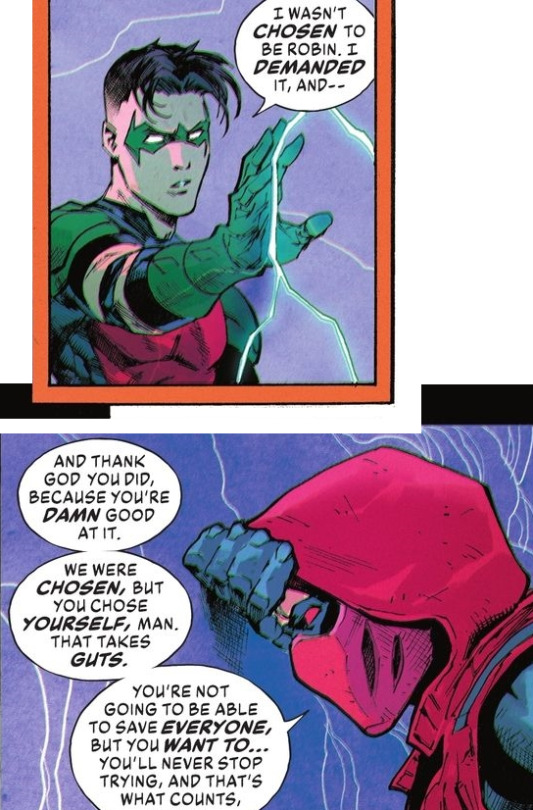
This excerpt goes perfectly with a different post I was working on, talking about what happened at Titans Tower.

(Jason narrating, referring to Tim; Teen Titans 2003 #29)
Tim chronically suffers from imposter syndrome. He's constantly doubting himself. But Jason has always believed, known, that Tim is good at what he does. And over time his conviction in regards to it has only grown stronger. Jason's high opinion of Tim's capabilities is actually part of the reason he was so hurt about being "replaced" by Tim, specifically.
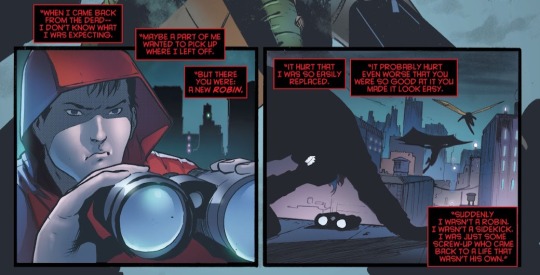
(Jason talking to Tim during Robin War; Red Hood/Arsenal 2015 #7)
Jason has always seen Tim as better than himself. All the while Tim has struggled to feel capable of living up to Jason's legacy. But Tim still took up the mantle because he cared and he had to try. And Jason recognizes that.
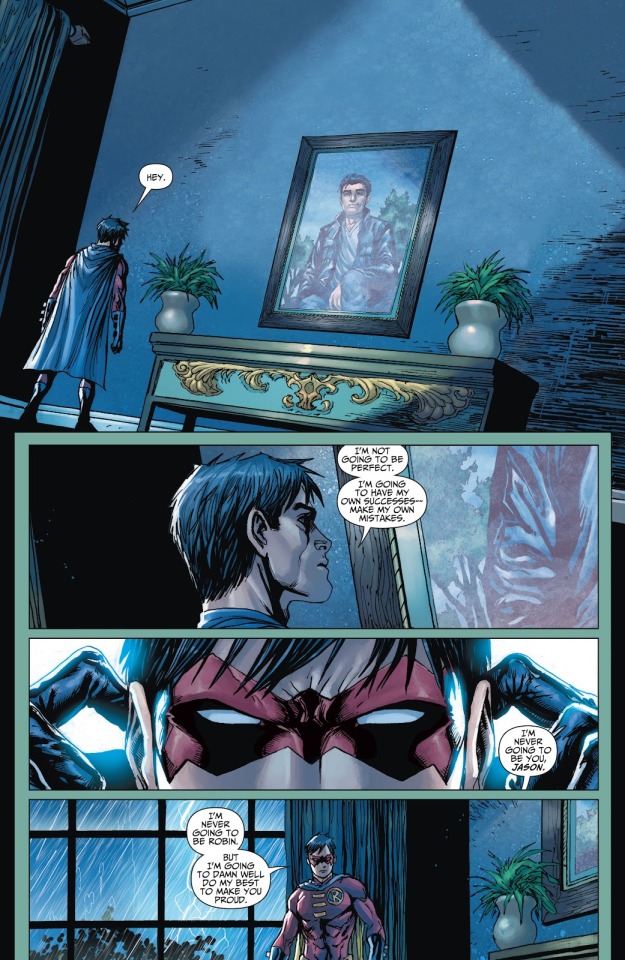
(Tim talking at a portrait of Jason, Secret Origins 2014 #3)
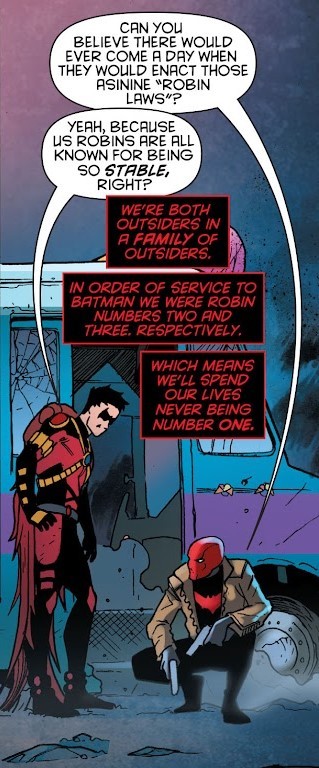

(Red Hood/Arsenal 2015 #37)
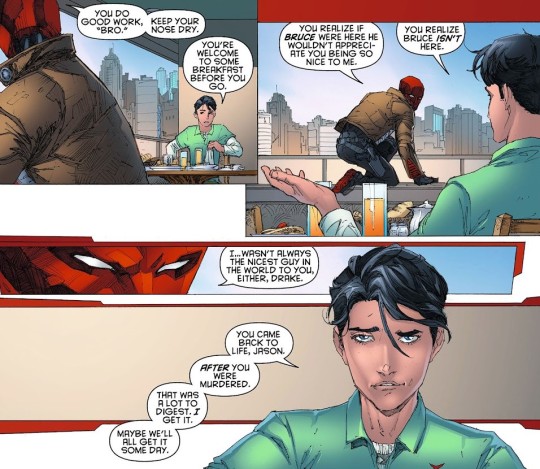
(Red Hood and the Outlaws 2011 #8)
In summary for this section: Tim and Jason tend to think lowly of themselves, but highly of each other. There's mutual respect and understanding. That's at the very core of their relationship and Knight Terrors showcases that beautifully.
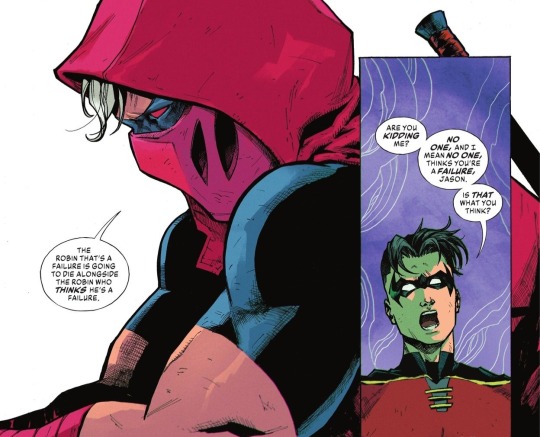
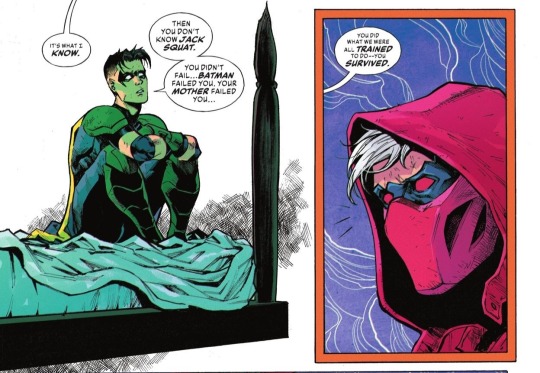

2)
Another great thing about their dynamic that gets shown off in this issue is that they make a damn good team and enjoy working together.

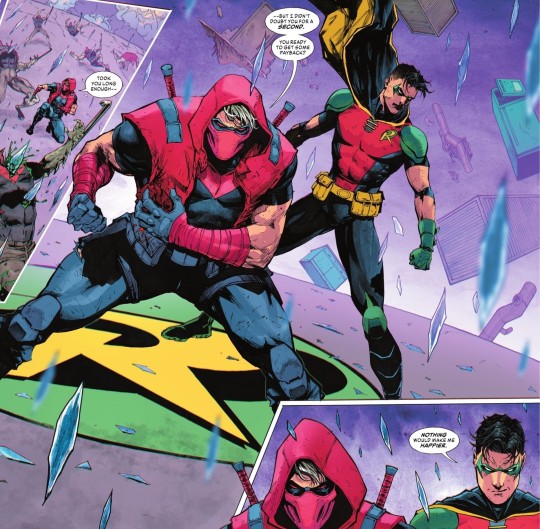
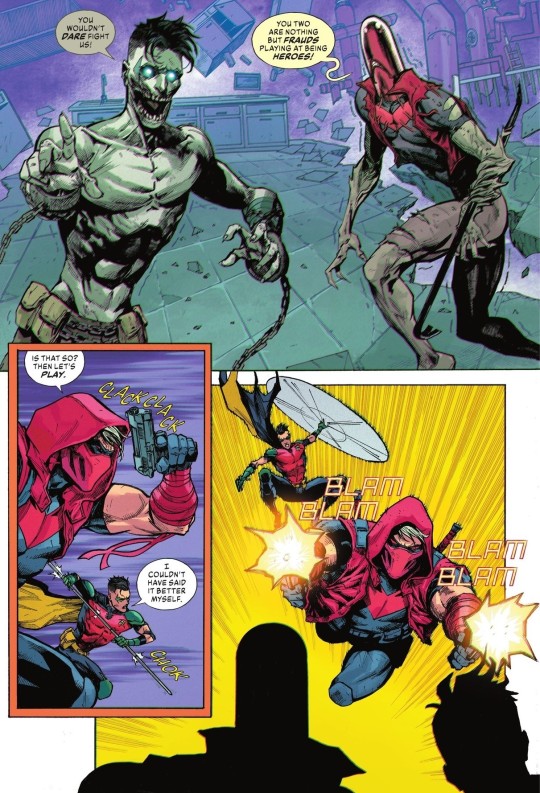
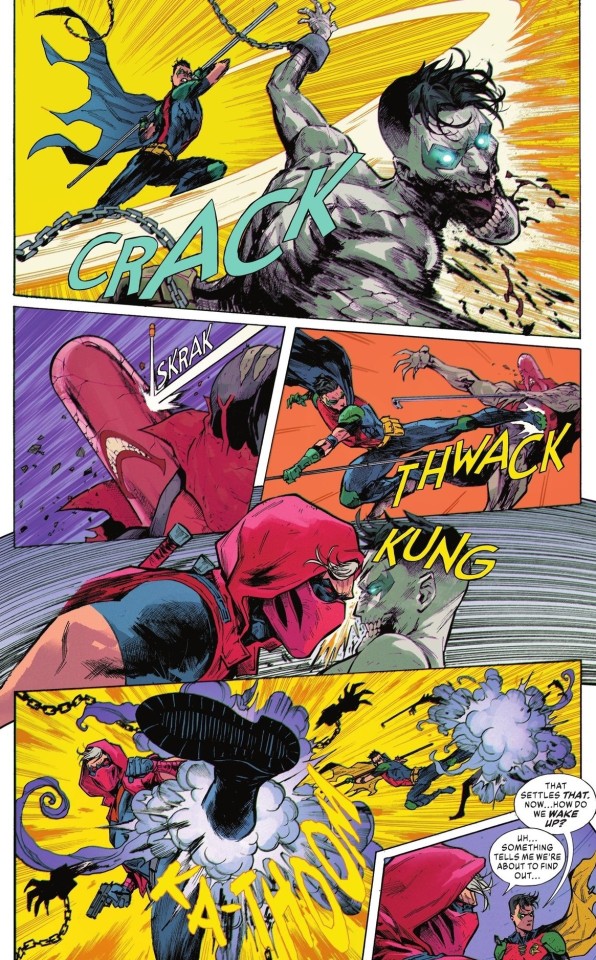
throughout the issue

(Tim narrating, Teen Titans 2011 #16)
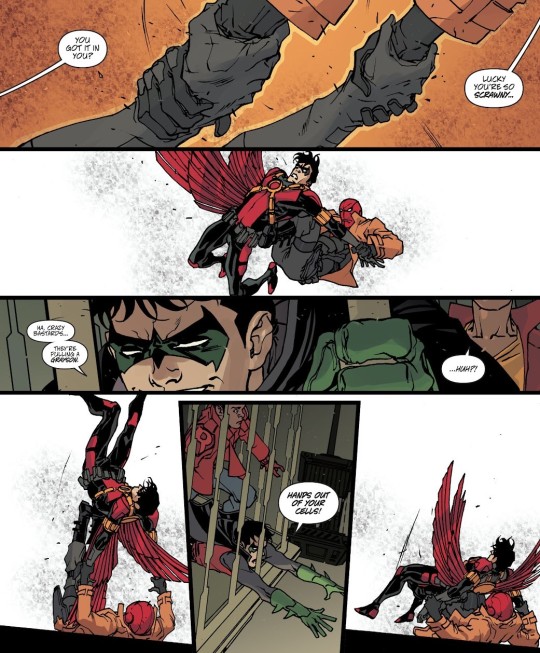
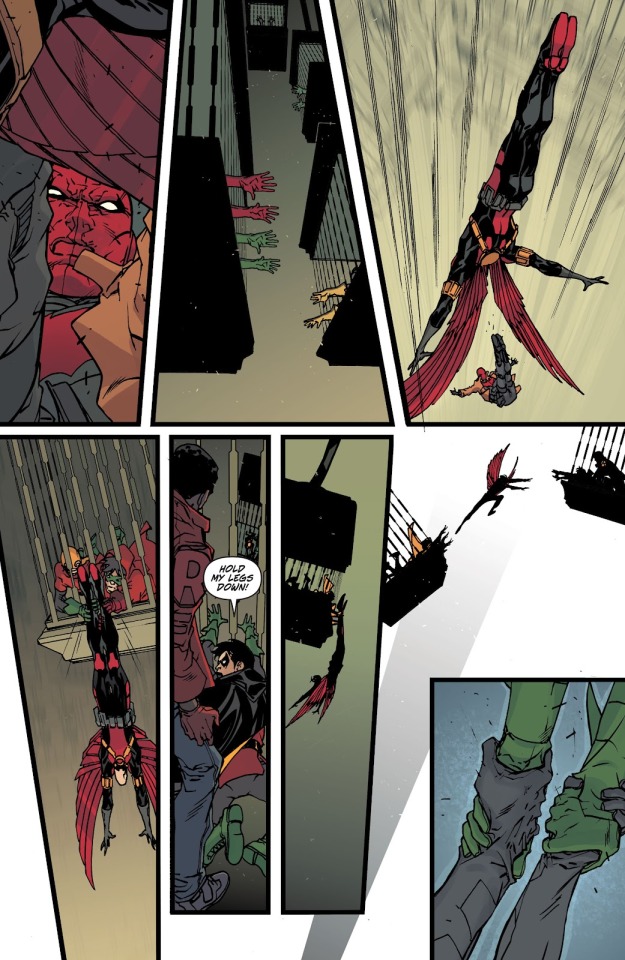
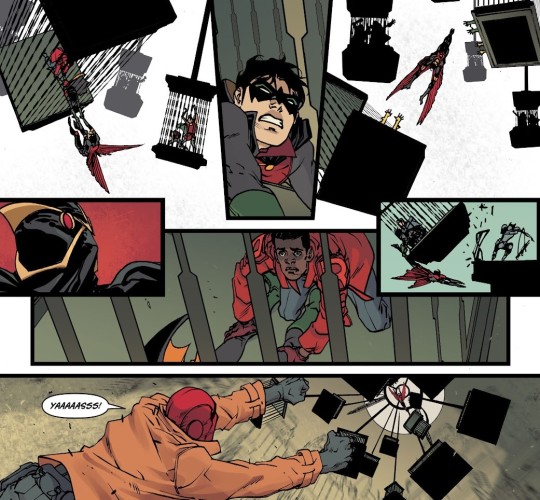
(We are Robin 2015 #7)
3)
Last but not least, we get some delightfully, painfully, tender moments.
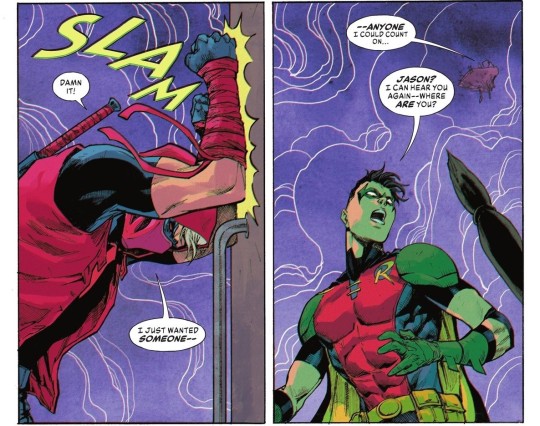
Jason wishes for someone to count on. And Tim is right there for him. Which gets heavily doubled down on at the end of the issue:
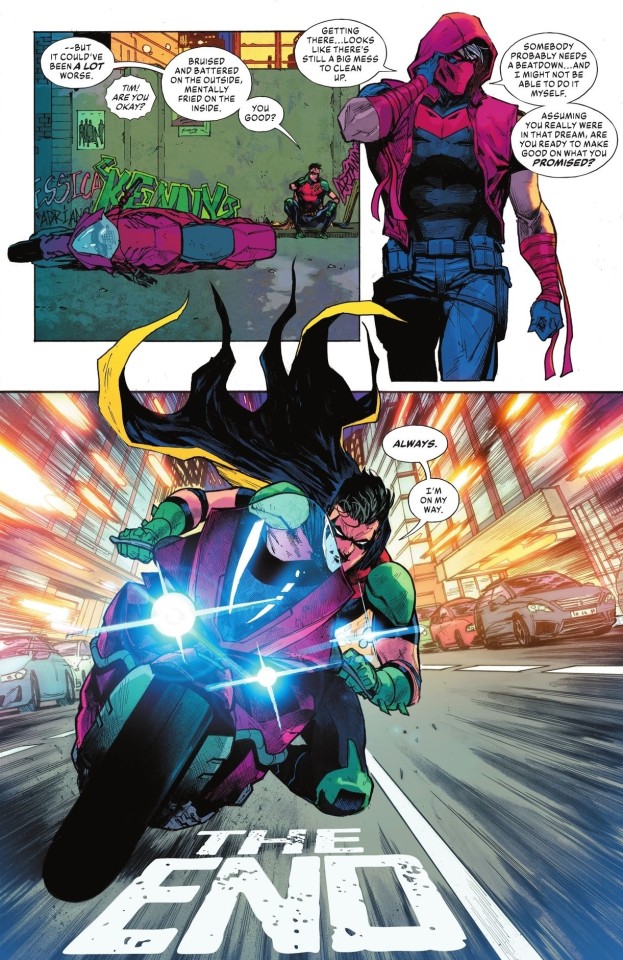
Tim is always ready to work with Jason, to lend a hand, to be there for him-
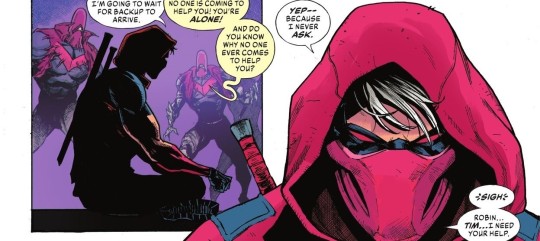
- and Jason trusts Tim with his life.
Which, speaking of life...
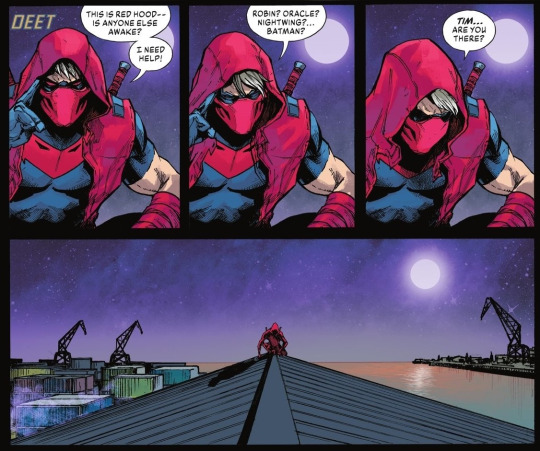
After waking up, Jason tries to get in contact with Tim and when he can't, we see how devastate he is, thinking something went wrong. Ouch.
In conclusion: I was worried going in, with DC's track record lately, but I can happily say I was beyond pleasantly surprised. This feels like a return to form, and I pray we'll get more content featuring these two in the near future. If you haven't checked it out yourself yet, I highly recommend reading this issue.
Thanks for listening <3 I know this was a lot hah
788 notes
·
View notes
Text
Honestly I love the kiss so much, but I love it even MORE as a response to the constant debate that Neil Gaiman has kind of been made to be in the middle of. That only a kiss would make it canon, that it wasn't "real queer rep" otherwise.
To which Neil Gaiman said, fine! You get three queer couples this season.
Here are Nina and Maggie. They are both women, they are both explicitly gay. They will be something someday, probably, but not yet. They need time, but they know they like each other. They do not kiss.
Here are Beelzebub and Gabriel. They are genderless beings that come in He and They flavouring, and they are very explicitly (and DISGUSTINGLY) in love, and they hold hands and serenade each other and everything. They do not kiss.
Here are Aziraphale and Crowley. They are genderless beings that come in a variety of flavours but have most frequently been He-ing it up. They have known each other over 6000 years. They have loved each other almost the entire time. They know each other better than any other beings in existence. They have lived their entire existence pretending there's nothing between them, far too afraid to call attention to the love that dare not speak its name, for fear at first of retribution, but deeper than that there is a fear of driving away the only being in the universe who understands and accepts them fully. Of losing the only friend they have in the world.
They kiss, and it is NOT a happy kiss. It is the FURTHEST THING from a relationship confirming kiss. It is a goodbye kiss, a throwing-sand-over-the-fire kiss. It is a truly DESPERATE kiss (and I've seen Richard II I know damn well that David Tennant can do a longing and fearful kiss when he needs to), and it hurts more than anything else.
There, Neil Gaiman says. You got your kiss. Are you happy? Are they real now? More-so than before?
TLDR: newsflash asshole they've been in love and queer the entire goddamn time.
#i have big feelings about the kiss#i have big feelings about the cosmic terror that kept either aziraphale or crowley speaking for many millennia#the denial that held them tight even years after the failed armageddon#good omens#good omens season 2#good omens spoilers#neil gaiman#good omens meta
696 notes
·
View notes
Text
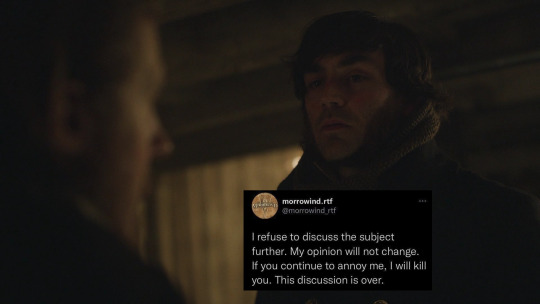

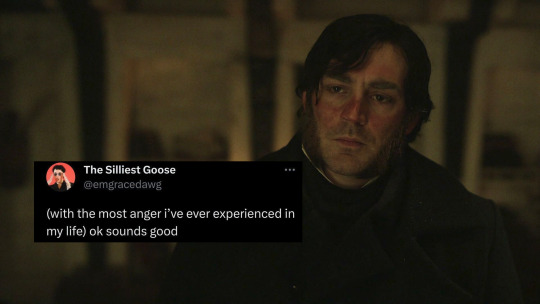

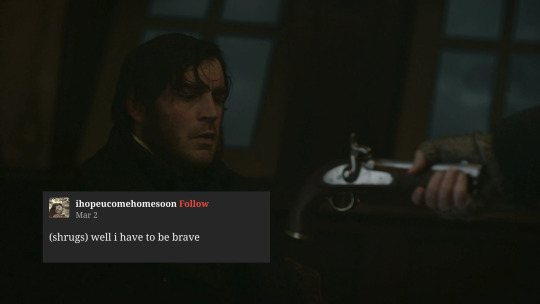

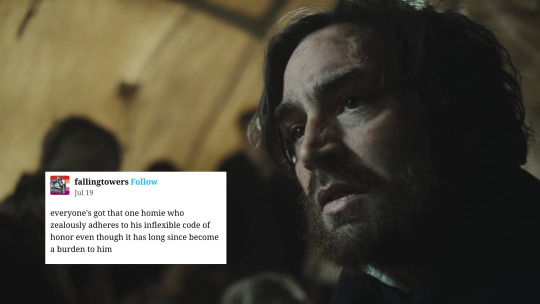
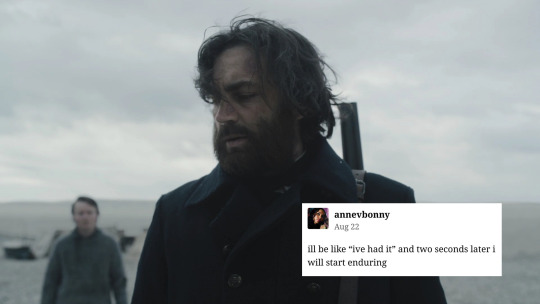
ned little voted most likey to get dealt a big losing hand 1845-48 (more terror text post memes)
#the terror#text post meme#edward little#terror shitposting#he is so fascinating to me and i am a bit sad that his most prevalent characterisation seems to be wet little anxiety man :(#bc this man has Layers!! but also im new here so idk how much of this first impression is true / how much of this convo has aready been had#which is why im making a silly meme post instead of writing 17 paragraphs of meta and putting my foot in my mouth#but yeah. nedward :D#sneaked some solittle into this post bc who am i if not someone w a narrative foils agenda 😌#cavetext
192 notes
·
View notes
Text
Upon a recent rewatch I noticed that the distorted singing that plays in the background of Irving's death is his own voice singing "Hampstead Is the Place to Ruralise" during Carnivale, which makes me feel wretched.
Hampstead Heath was historically a popular gay cruising ground, and while the song was published in 1861, well after the events of the story, the intense level of detail in the material culture depicted in the show suggests that the creative team knew what they were doing and went out of their way to pick this song for the euphemism.*
Throughout the series we see Irving afraid of Hickey, or rather his own desire for men that he recognises in the other and the associated "chaos" that could ensue. Add to that David Kajganich saying that Irving thought Hickey and Farr were having intimate relations and approached them to "stop it or to touch it", and Hickey's attack seems to subtextually validate Irving's fear that were he to entertain his desires, disaster would strike. The song with its euphemistic context, a distortion of a merrier moment, highlights Irving's nightmare.
This ties to the whole personal tragedy of Irving's end. When he meets Koveyook and his companions, Irving introduces himself first by rank and title, before simply "John". His sheer joy and relief at connection and Koveyook's kindness hints at the possibility of building a sense of self based not on what the Empire wants him to be, but only who he is as a person among persons. It's hardly guaranteed that survival would have led him to accept himself wholly, but I feel that all these details suggest a potential for further growth, untimely snuffed out.
*EDIT: I did not know this anachronistic song choice was an honest mistake (according to David Kajganich’s Q&A) when I made this post. Forget what I said about intentional creative license. However, the euphemism still works for me.
#apologies if this is getting incoherent but i have emotions#ruralise ritituralise extramuralise#john irving#amc the terror#the terror#meta#terrorposting
374 notes
·
View notes
Text
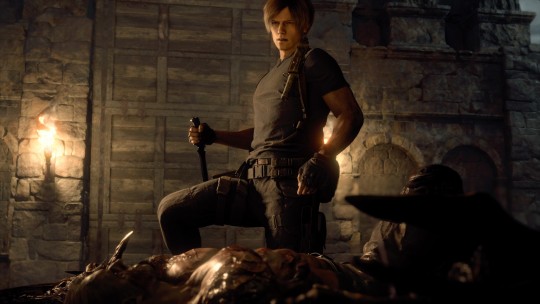

The catalyst for Leon's growth in RE4make is his commitment to killing someone he loves, despite the fact that his main source of personal conflict so far is that he can't save anyone -- especially not the people that he loves.
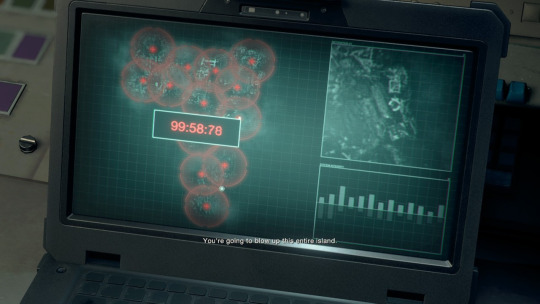

The catalyst for Ada's growth in RE4make is her commitment to saving someone who's in her way, despite the fact that her main source of personal conflict so far is that she continues to encounter emotional roadblocks that have impeded her goals and put her own life in danger, and she doesn't want to repeat her mistakes from Raccoon City.

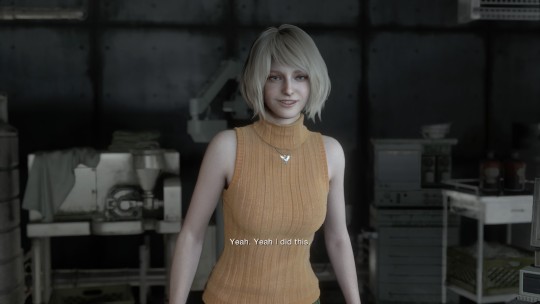
The catalyst for Ashley's growth in RE4make is her commitment to saving herself, despite the fact that the base premise for her character is complete and total helplessness.
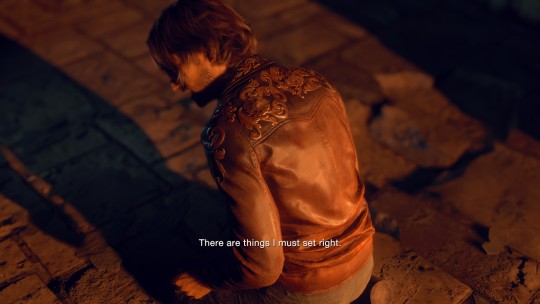
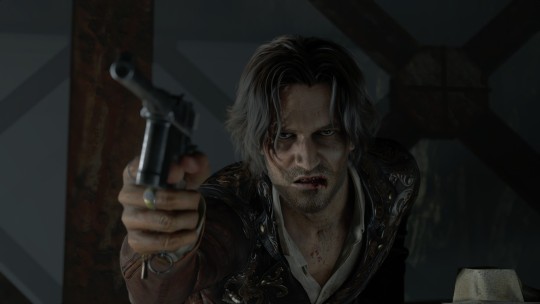
The catalyst for Luis's growth in RE4make is his commitment to saving the life of someone else over himself, when he starts the game willing to let Leon die in order to save himself.
This is how change arcs work. The story has to take a fundamental part of the character and challenge and subvert it.
Leon had to be the one to kill Krauser.
Ada had to choose to honor Luis's memory by saving Ashley (and Leon).
Ashley had to be the only one in the lab to save Leon.
Luis had to be the one to shoot Krauser's knife away.
These are all moments that I've seen brought up as points of contention within the fandom -- people say that the additions of/changes to these scenes are just "fanservice," but that's just not true. These scenes were added/rewritten with the intention of allowing characters' arcs to play out all the way through.
What Capcom wrote is good storytelling crafted with all characters in mind and all the story's themes accounted for. What you want to have happened instead because you think x character "deserved it more" -- that is the fanservice.
#resident evil 4#leon kennedy#ashley graham#ada wong#luis serra#meta analysis#I'VE BEEN TAKEN OFF SHADOWBAN AND AM BACK IN THE FANDOM TAGS TO TERRORIZE YOU ALL WITH LITERARY ANALYSIS ONCE AGAIN
163 notes
·
View notes